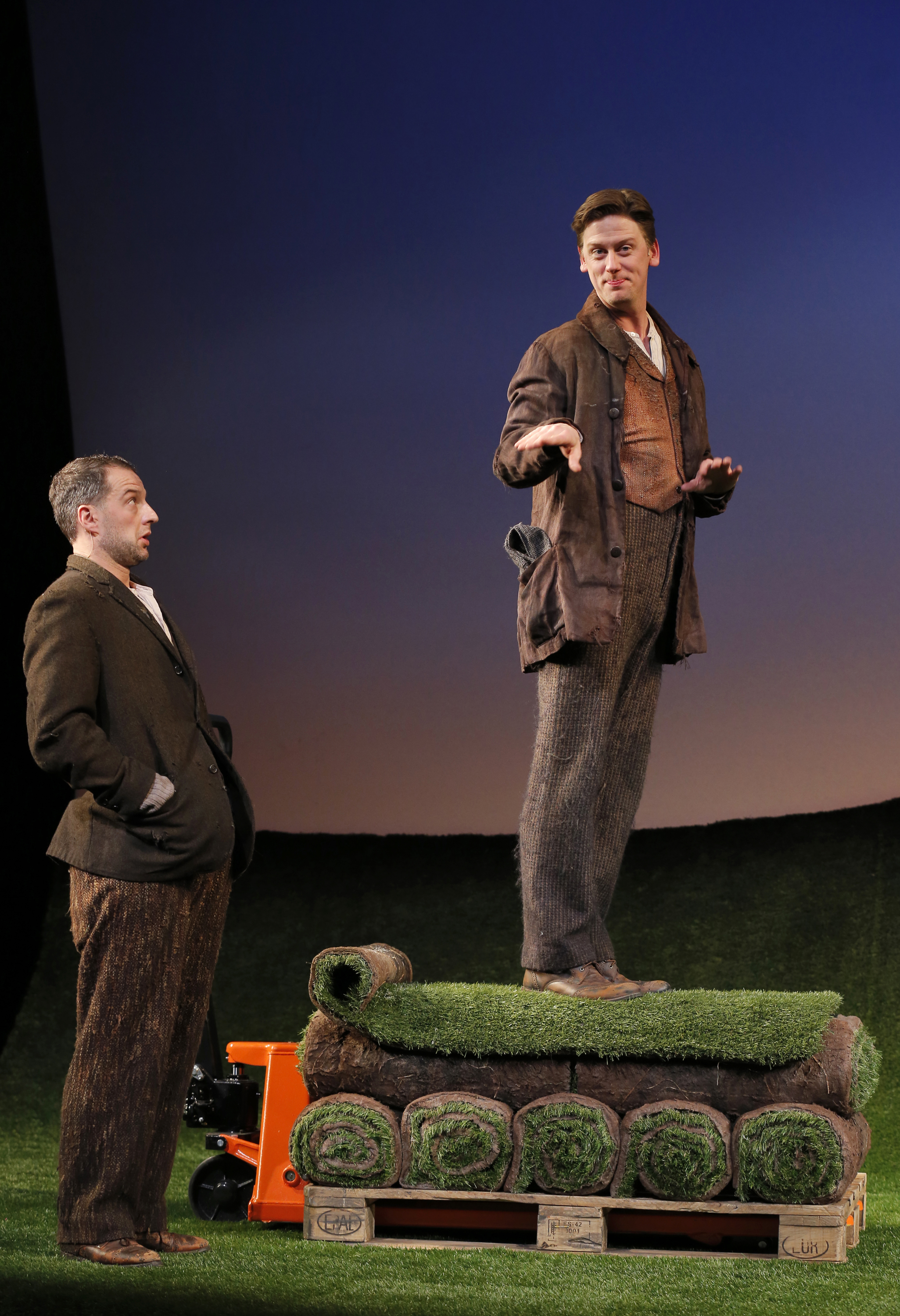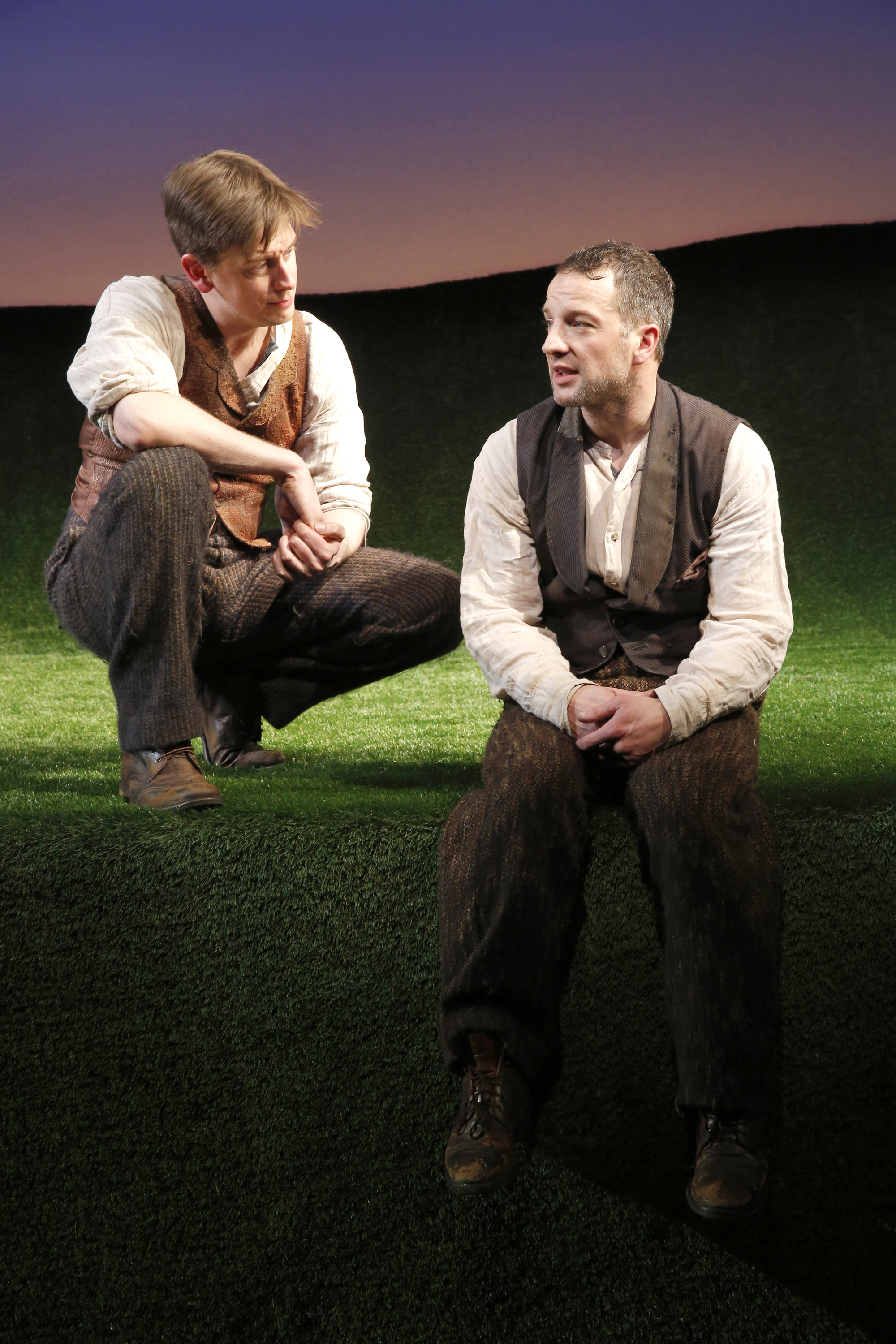With a two-person cast that enacts over a dozen characters, Marie Jones’ Stones in His Pockets, at the Yale Rep, directed by Evan Yionoulis, makes us think about the hierarchy of acting. Typically, in any theatrical production, there are starring roles, minor roles, and extras, and there are character actors and caricatures. Fred Arsenault and Euan Morton, between them, give us all the parts in the play—as presented by Jake Quinn (Arsenault) and Charlie Conlon (Morton), two likeable locals enlisted as extras on a big Hollywood movie being shot in picturesque County Kerry, Ireland. There’s Caroline Giovanni (Morton), the campy American female lead; Clem (Morton), the dour British director; Mickey (Arsenault), the crusty veteran extra (he was in John Ford’s The Quiet Man), and other locals, including Sean (Arsenault), persona non grata on the set, and movie people, such as Aisling (Arsenault), the prancing assistant director in charge of the extras.

The comedy of this lively and thoroughly entertaining show derives not only from the clash of locals and Hollywood, but also from poking fun at a certain type of silly film. Part Two opens with a “gag reel” of attempts by Ms. Giovanni and her leading man (Arsenault) to get their delivery right, and the sequence helps distance the utterly fake world of film from the more realistic world of theater. No mean feat, since any play in which two men change into a range of characters by changing their speech, accents, and body language, but, mostly, not their costumes, can be called anything but “realistic.”
And that’s the paradox. The play manages to get at the realities behind the business of staging fake worlds, and it does it with a battery of a more or less stock characters, including that stereotypical “stage Irishman,” the irascible drunk. Among the characters, then, there’s little you haven’t seen before, but, on the other hand, that very familiarity helps rope us in. What Jones has in mind is the idea that the only way to intrude reality into predictable Hollywood fare is to focus on “the extras.” And it’s the perspective of the extras that keeps things real.
Charlie, you see, has a script he wants to have made into a film, but, due to a tragic event that occurs during the making of the film he's an extra for (Quiet Valley), he decides to shift the focus to a local lad brutalized by insensitive professionals and humiliated in his own town pub. The scene in which the director tells the novices why Hollywood would never be interested in such a tale (“People don’t go to the movies to get depressed. That’s what the theatre’s for.”) puts the proper critical emphasis on the play we’re watching. A suicide—drowned with stones in his pockets—is the basis of Charlie’s script. And that script is our play, which is why it’s left to our two extras to enact the entire show. Only Charlie and Jake belong to both worlds, so only they can act out the mannerisms of both. And only a play with a limited cast, it seems, can afford to tell the truth.
Along the way, the fun is in the caricatures Morton and Arsenault put on and off as fast as gold can sheen, and in stage business, such as miming and a “Lord of the Dance” routine from out of nowhere, and in the clash of worlds and accents and expectations—and in an absurdist use of cows. Arsenault and Morton are wonders of timing and mugging and swishing and falling about the place, and there’s great pleasure in watching them, at play’s end, take bows as each character. The production also runs its credits on the big screen, and it’s fun to see the production crew and the Rep staff scroll by like names in a Big Budget Production.
Stones in His Pockets ribs the Film Industry as a Land of Cockaigne for otherwise strapped people, able to be bought as background authenticity for a world of fake emotions, fake nostalgia, fake laughs. And the play mainly has sport with that—until something real happens. At that point, the interest is in seeing which characters will cease to simply “play as cast” and which will cast the first stone.
Stones in His Pockets By Marie Jones Directed by Evan Yionoulis
Scenic and Projection Designer: Edward T. Morris; Costume Designer: Nikki Delhomme; Lighting Designer: Solomon Weisbard; Sound Designer: Matt Otto; Production Dramaturg: Sarah Krasnow; Dialect Coach: Stephen Gabis; Casting Director: Tara Rubin Casting; Stage Manager: Nicole Marconi
Photos by Joan Marcus, courtesy of Yale Repertory Theatre
Yale Repertory Theatre January 25-February 16, 2013


